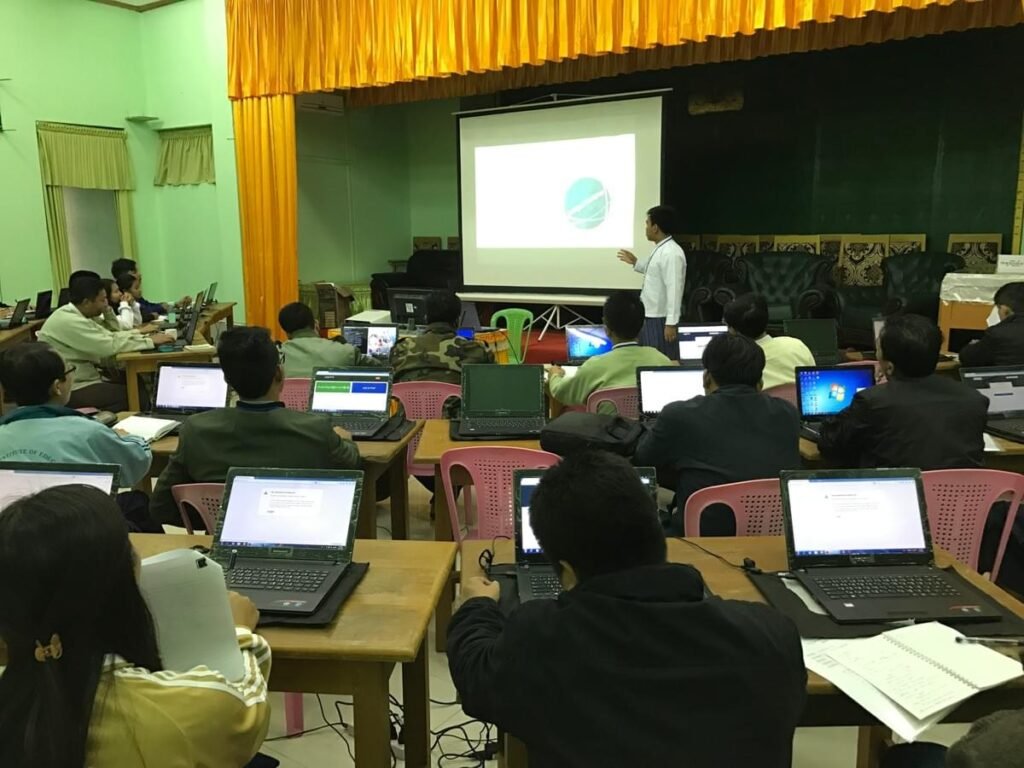By Yee Thu Aung
For developing countries, modernizing governmental procedures and boosting Information and Communications Technology development in state governments take time and need stronger efforts. At the same time, as many Small and Medium sized Enterprises (SMEs) have surfaced in recent years, there is a growing need for platforms which could serve as a medium between government and SMEs. One social enterprise is taking the lead in Myanmar.
The Door Institute was created with an aim of building an integrative and supportive society which is self-reliant and which has a capacity for self-development. Its mission is to contribute to the progress of local development in Myanmar by technically supporting regional governments and empowering professionals and SMEs.
The Door targets to support three groups namely, the public sector (government agencies), the private sector (SMEs), and grass-roots communities. They have been working towards accelerating development that focuses on SMEs in order to attain more productive and responsible businesses in a way that they also address social issues in their respective communities. Moreover, they are also working with regional governments, universities, non-profit organizations, and civil society organizations with the intention of developing their management practices to make sure that the respective institutions can utilize their resources.

Photo by Door Institute
“The Door Institute was initially founded with the aim of helping communities in rural areas. We emphasize on capacity building and ICT sector development of provincial governments,” The Door Institute founder, Ko Yan Naing Oo said. He has worked with NGOs in the past and have always wanted to help the rural communities in Myanmar. Six months after leaving his last job, he founded the Door Institute which he hoped would help fulfill both the technical and social needs of his targeted population.
“It was not easy at first. I had to initiate the business with very little budget. In the beginning, I did everything on my own as I could not hire a full-time staff,” he shared. Having a strong passion for helping communities and reducing development gaps between urban and rural areas helped him move forward.
Core Programs
The Door has three core programs designed to accelerate development in particular regions. The programs focus on three areas which include e-government for better public services and in-office practices, SMEs for responsible innovative businesses, and grassroots people for better careers. Below are the three programs:
1. The Project Management and Business Planning Training Program (PMBP)
This program was strategically designed to empower SMEs, young entrepreneurs, and individuals who are leading companies or organizations in Myanmar in terms of strategic planning, organizational structure development, and seeking socio-economic development for their communities. Unlike other business training programs, the program not only coaches the businesses on their development but also educates them on social and environmental issues.
2. The ICT and Cyber Security Training Program (ICS)
The program closely works with regional governments in Myanmar in order to impact a better operational change within regional governments. The training promotes not only theories which are fruitful for transforming e-governments and cultivating a deep understanding of the intranet, but also develops practical skills to directly apply in the office for productive and efficient process whilst dealing with documents after the training.
3. The Community Empowerment Program (CEP)
This program’s goal is to empower locals to make sure they have access to professional advancement programs to enhance their knowledge and skills for better careers.. The program maintains good relations and an open network with employers organizations and companies. They also conduct business talks in cooperation with universities and non-profit organizations.

Photo by Door Institute
Business Model and Internal Operations
The founder and the program coordinator are the company’s only full-time staff. The founder is mainly in charge of strategic planning and communication while the program coordinator is mainly in charge of reports, finances, and internal operations. To conduct the training programs, there are 13 consultants who are hired with freelance contracts on different programs.
The Door is a self-funded social enterprise and its income mainly comes from project management and training programs for SMEs. The ICT development program and Community Empowerment Programs are free of charge for attendees.
Challenges and Difficulties
According to past experiences, NGOs and private companies have not yet gained state governments’ trust as they have difficulties communication well with them. “When you work with the government, it is important to understand protocols and their perspectives in order to gain their trust,” Ko Yan Naing Oo shared.
Most of the businesses in Myanmar are SMEs and they are currently facing difficulties since they do not know how to effectively and efficiently manage their businesses. The Door provides tools and techniques to manage, develop, and transform their businesses effectively with less difficulties while making sure of addressing the social issues in the community by conducting business management related programs and trainings in different parts of the country.
At present, the Door has served many businesses and covered many parts of the nation while conducting training programs with no political interference or intentions.

